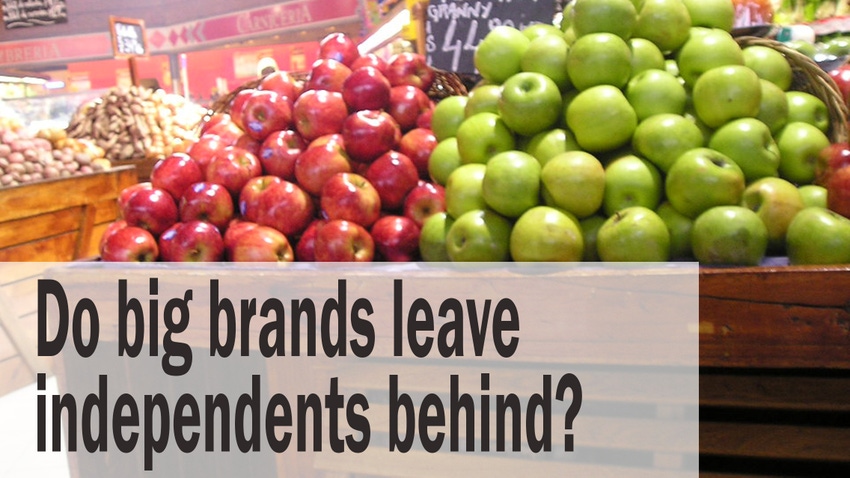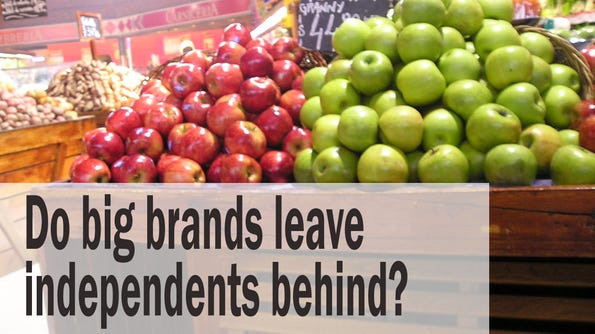May 21, 2013

 One ice cream purveyor froze out Walmart when the giant retailer came knocking. Is such a cold shoulder needed in the natural products industry?
One ice cream purveyor froze out Walmart when the giant retailer came knocking. Is such a cold shoulder needed in the natural products industry?
Here’s the story in short about Graeter’s, a local (based in and focused on the Midwest) and growing ice cream company that turned down the opportunity to go into 4,000 Walmart stores. The company declined without being negative about Walmart. The opportunity just didn’t fit with the premium brand the company exudes. Graeter’s is an upscale, expensive product that didn’t see itself fitting with a very large retailer (which would have mandated ramped-up production) with a strong focus on lower prices (which would have created a backlash from current retailers). Read the complete story here.
I suspect company leaders looked down the road and realized Graeter’s wouldn’t have been a good, long-term fit at Walmart and that its time in the freezers there would have come to an end in a year or two. Then it would have been time to reduce production, mend fences with other retailers, cut staff, rebuild its image to restore its pricing and so on. It seems that the management team at Graeter’s looked a few years beyond the offer on the table and thought better of it, determining that the grass was not greener.
Is it natural?
This situation, and how the brand responded to it, echoed the “No Mass Market” rallying cries of the 90s in our business. For the past few months, I’ve been on a bit of a listening mission, seeking opportunities to visit with independent natural products retailers. I like to think that I am in touch with the opportunities and challenges in front of these passionate entrepreneurs, but it is always good to be sure. One theme that has come up all over the country is the issue of natural brands that also seek to be sold in conventional or mass retail channels.
Distrust would be one of the more benign emotions this arouses. Depending on the retailer, the brand and the situation, disgust and disdain are not uncommon.
As a business person, a reasonable question might be: Why is a brand adding channels to its distribution a big deal? Of course, the initial channel now has additional (and different) competition, but isn’t it each brand’s obligation to seek out growth opportunities? Isn’t that part of the expectation of its shareholders/owners and its employees? Wouldn’t that particularly be true in the natural products industry where brands are formed to promote healthy eating and living?
I don’t know that these valid but simple questions really capture the whole dynamic that is in play.
Amy's effect
An example is what I call the “Amy’s Effect.” (In the spirit of full disclosure, I am a big fan of Amy’s. I love the products and think the world of what Andy and Rachel Berliner have done with their company) You will now find Amy’s products in nearly every grocery store frozen set in the country, with several products, maybe two or three shelves worth. However, in a natural products store, you will find two or three doors worth. Yes, the grocery stores are carrying only the top items and picking up some easy sales, but they are also creating awareness of this awesome brand and the whole family of available products. When people want to learn or purchase more, you know where they have to go to find them.
The other side of the coin, however, is that the products in the naturals industry aren’t made to be sold just by lowering the price and putting them on an endcap like so many items in other channels. They require education and staff interaction to be sold. A natural products customer is not made by selling a product but by relationship building and developing a lifestyle around the consumption and use of natural products. This kind of customer involvement does not exist in the aisles of a typical drug or grocery store but does in a natural products store. Will natural products sell via simplistic marketing messages rather than via involvement from trained, caring and passionate staff?
Taking nothing away from great product formulation and eye-catching packaging, the major brands in the natural products marketplace would not be where they are had they not caught on with local retailers that sold them one at a time to those who frequented their stores. Is it proper, once a brand gains size and reputation, to move on and neglect those who gave it its start and built the foundation?
(If you do feel that you need to “make the leap,” do it in such a way that those who gave you your start can still carry your brand competitively, if they choose to do so. That might be a topic for another day!)
Maintaining specialty appeal
Natural products stores might choose not to carry or at least not promote brands that have moved into other channels. At its root, this is not an emotional decision but a calculated business determination. Natural products merchandisers are “specialty” retailers, meaning that they sell products that are not in widespread distribution. In this sense, they are not that different from specialty bookstores, pet stores, hobby shops and other outlets that carry unique items. They stock “destination” products, items customers have to make a special trip to a special store to get—and that are so special those consumers don’t mind doing so. Availability at other classes of stores and channels diminishes the brand allure and, to some degree, the whole store. Moving it (like to the bottom shelf) or removing it protects the store’s reputation and image.
When I mention to some in our industry that the distribution strategies of certain major brands have put them in a position in which they are not looked upon favorably by independent stores, I get a “Are you kidding? Aren’t they over that yet?” kind of scornful response.
If we as an industry are going to respect a brand that tries to grow its business, shouldn’t we also respect a store that tries to protect its brand?
About the Author(s)
You May Also Like




